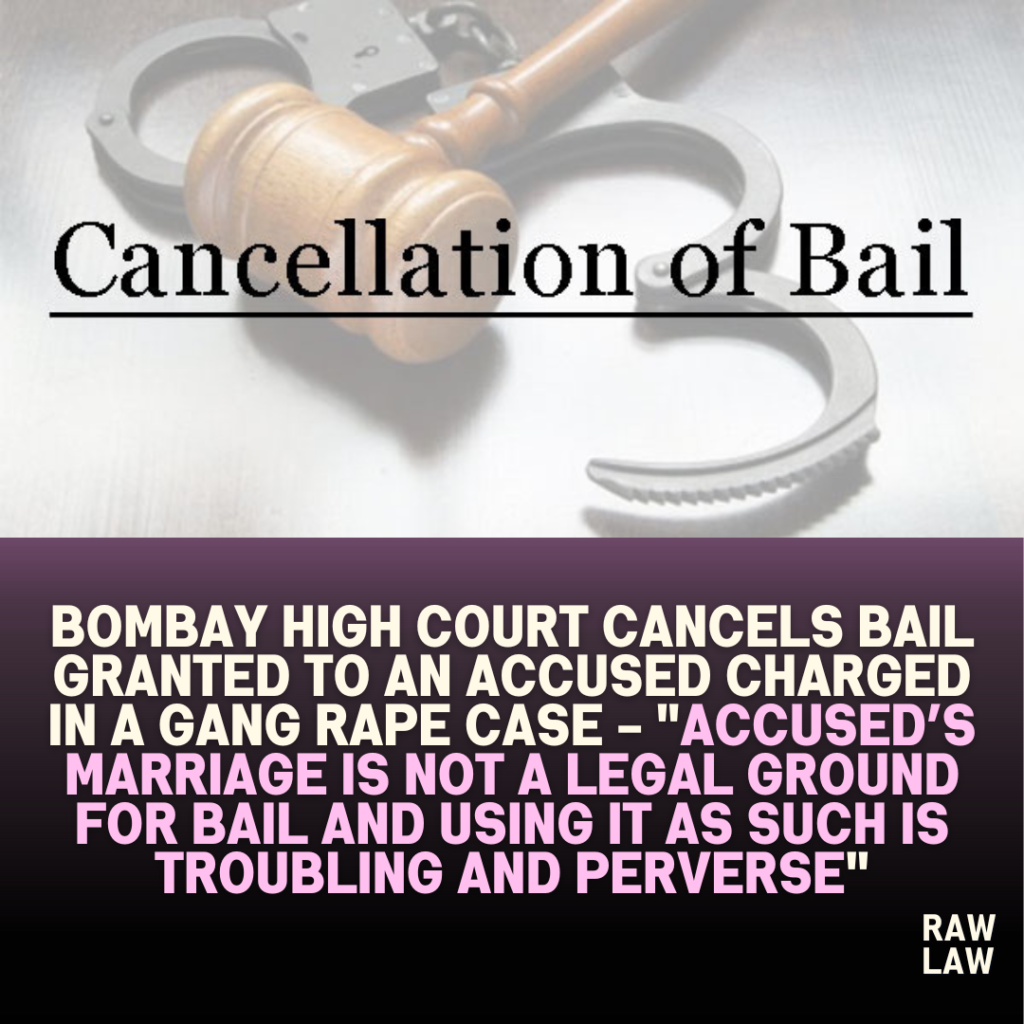Court’s Decision
The Bombay High Court (Justice Dr. Neela Gokhale) cancelled the bail granted by the Sessions Court to an accused charged in a gang rape case. The Court held that the trial court ignored material evidence, including medical and witness statements and wrongly relied on the accused’s impending marriage as a ground for bail. The Court directed the accused to surrender within two days, observing: “Impending marriage of an accused is not one of the parameters for grant of bail.”
Facts of the Case
- FIR (C.R. No. 1309/2024) was registered at D.N. Nagar Police Station against three accused, including the respondent, under Sections 70(1), 115(2), 351(2), 123, 3(5) of the Bharatiya Nyaya Sanhita, 2023, for gang rape and assault.
- The complainant, who had known one accused for over ten years, alleged that she was called to a flat on 9 December 2024, given a spiked drink, beaten, disrobed, and raped by all three accused after being tied and her phone confiscated.
- Medical examination revealed a head injury, scratch marks, and other signs of violence.
- Supplementary charge-sheet contained indecent photographs of the complainant recovered from one accused’s phone.
- Despite this, on 24 February 2025, the Sessions Court granted bail to the respondent-accused, partly on the ground that his marriage was scheduled for March 2025.
- The State and the complainant challenged the order before the High Court.
Issues
- Whether the Sessions Court erred in granting bail without appreciating the gravity of the offence and material evidence.
- Whether impending marriage of an accused can be considered a valid ground for bail.
- Whether cancellation of bail was justified in the present case.
Applicant’s Arguments (State & Victim-Complainant)
- The Sessions Court overlooked medical evidence showing head injury and physical violence.
- It failed to consider the complainant’s Section 164 CrPC statement consistent with the FIR.
- Ignored supplementary charge-sheet evidence, including photographs recovered from accused.
- Bail was granted based on irrelevant consideration of the accused’s impending marriage.
- Relied on Shabeen Ahmad v. State of UP (2025 INSC 307) and Ajwar v. Waseem (2024) to argue that superficial grant of bail undermines faith in the justice system.
Respondent’s Arguments (Accused)
- Alleged discrepancies between FIR and Section 164 statement, claiming improvement by complainant.
- Pointed to CCTV footage showing timeline inconsistencies.
- Defended Sessions Court’s order, arguing no fresh injuries were found on complainant’s private parts.
Analysis of the Law
- The High Court noted the 164 statement and FIR were consistent in narrating the brutal ordeal.
- Medical report corroborated with head injuries and other physical violence, overlooked by the Sessions Court.
- The Trial Court focused only on absence of injuries on private parts and marriage of the accused, ignoring other evidence.
- Citing Ajwar v. Waseem (2024) and P v. State of M.P. (2022), the Court reiterated that bail in heinous crimes requires consideration of gravity, role of accused, impact on society, and material evidence.
- Observed that marriage is not a legal ground for bail and using it as such is “troubling and perverse.”
Precedent Analysis
- Shabeen Ahmad v. State of UP (2025 INSC 307) – Bail can be cancelled if trial courts grant it superficially in grave crimes.
- Ajwar v. Waseem (2024) 10 SCC 768 – Courts must weigh gravity, role, and societal impact before granting bail.
- P v. State of M.P. (2022) 15 SCC 211 – Bail can be interfered with if order is perverse or ignores relevant material.
Court’s Reasoning
- The Sessions Court erred in ignoring charge-sheet and supplementary charge-sheet material.
- It wrongly emphasized absence of injuries on private parts and impending marriage of the accused.
- The evidence on record prima facie indicted the accused; granting bail on such grounds was perverse.
- The offence of gang rape is heinous; courts must be cautious in granting bail.
Conclusion
The Bombay High Court cancelled the bail order of 24 February 2025 and directed the accused to surrender within two days. The Court held: “Considering the totality of circumstances, I am satisfied that the Trial Court has ignored the relevant material and failed to consider the gravity of the offence. Impending marriage is not a ground for bail.”
Implications
- Courts cannot grant bail in heinous crimes like gang rape based on irrelevant grounds such as marriage.
- Reiterates strict scrutiny for bail orders in serious offences to maintain public faith in judiciary.
- Strengthens victim-centric approach by ensuring material evidence is given primacy over personal circumstances of accused.
Also Read: Bombay High Court: Mere filing of suit for dissolution does not mean closure of factory; Court Receiver cannot be directed to run business” – Industrial Court’s order set aside



